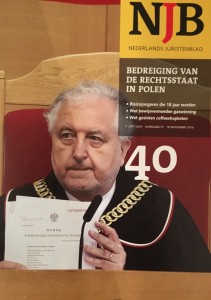 Blog (English translation) by J.W. Fokkens, former Attorney General of Dutch Supreme Court & C.H.W.M. Sterk, member Dutch Council for the Judiciary.
Blog (English translation) by J.W. Fokkens, former Attorney General of Dutch Supreme Court & C.H.W.M. Sterk, member Dutch Council for the Judiciary.
Between 5th and 7th October last we visited Warsaw with a group of about fifteen people, as part of a program by the Dutch Academy for Public Administration (NSOB). During this visit we met with prof. Andrzej Rezplinski, president of the Constitutional Court, and seven other judges, among whom was also Darius Zawistowski, chairman of the Polish Council for the Judiciary.
The things our Polish colleagues told us troubled us to such a degree that we feel the need to openly express our concern and share it with the legal community.
The president of the Constitutional Court rose to address us. He spoke softly, clear and to the point, but also dazed, as if he could still not believe what he was about to say. Every time when, during this speech, he touched upon a violation of the constitution, he waved the small booklet he held in his hand: stressing again and again that he would remain loyal to the Constitution, because that is the anchor of any judge under the Rule of Law.
He started out his speech by pointing out that for the last year, Poland has been ruled by Jaroslaw Kaczynski, even though the latter is nominally only a member of the Polish Parliament. This means that the president, prime-minister and all the members of government abide by the commands and whims of this strongman. Every week, they come to his house to receive their instructions (violation of the Constitution). Kaczynski is a great admirer of the German legal philosopher Carl Schmitt, who is controversial for his initial support to the regime of Adolf Hitler. In Schmitt’s worldview, the Sovereign is central, he expresses the will of the nation, and therefore should –in short- have all the power in a State. Based on these ideas, Kaczynski operates without regard for the principles of the Rule of Law, the separation of powers or an independent judiciary (violation of the Constitution). Kaczynski uses all his power to wage war – a word prof. Rezplinski used repeatedly – against the independence of the judiciary (violation of the Constitution). His goal is to destroy that independence and reshape the judiciary into an instrument loyal to his nationalistic political agenda (violation of the Constitution).
This ‘war’ began in October 2015, soon after Kaczynski’s party won a majority in both chambers of parliament and Andrezj Duda, a party-member, won the presidential race. Kaczynski’s first objective was to rule out the Constitution, by obstructing the work of the Constitutional Court to an extent that it can no longer test the bills, passed by Parliament, for constitutionality (violation of the Constitution). As a first step toward that goal, rulings by the Constitutional Court the government deemed undesirable, were not published in the Law Gazette (violation of the Constitution) and consequently not executed by the government (violation of the Constitution). After that, the Polish president (until this day without explanation) refused to swear in three Constitutional Judges appointed by the previous parliament (violation of the Constitution), leaving just twelve judges in the Court to do all the work, instead of the constitutionally required fifteen. Then the new parliament appointed – supernumerary (violation of the Constitution) – three new Constitutional judges loyal to Kaczynski. These three are not recognized by the Constitutional Court. Next, as a matter of formality, Parliament adopted new laws seriously obstructing the Constitutional Court, within three hours after they were submitted (violation of the Constitution). The most recent attack on the Court is a law lowering the maximum age of Constitutional Judges to 70, thus instantly creating two vacancies. These two vacancies, together with the regular vacancies, ensure that Kaczynski’s party will have a loyal majority in the Constitutional Court within eighteen months.
Besides this, Rezplinski and other members of the Constitutional Court have recently become the subject of threats from various sides. The police and prosecutor’s office don’t feel that threats to members of the Constitutional Court merit any attention. The president suspects that this reluctance is connected to a recent law-amendment, putting the Minister for Justice in charge of the prosecutor’s office, thereby transforming the prosecutor’s office into an instrument for Kaczynski’s nationalistic politics. Casually he added that the Minister for Justice recently intervened (without explanation) in the promotion course of a judge. In Poland judges can only be promoted after they have done a couple of cases at a higher court. During the proceedings of a big criminal case at a court of justice, as part of such a promotion course, the Minister for Justice decided to remove the judge from the promotion course (violation of the Constitution). The criminal case had to be started anew. The president suspected that the intervention has something to do with the fact that the Minister had been fined by this judge, some years ago.
The president and the other Polish colleagues present believe that the biggest blow to the independency of the judiciary is yet to come. The Minister for Justice has announced a bill that will lead to a merging of district courts and regional courts. The president said that such merger means that the judges at these newly formed courts must be sworn in again. There is a fear among the judiciary that the government will not appoint or swear in the judges it is displeased with. Recent events support this fear (see above). If the bill passes into law, and their fear comes true, the damages to the Rule of Law in Poland will be vast and lasting.
At the end of his plea, the president also spoke about hope. Hope that the Polish electorate will break Kaczynski’s power at the elections in three years. Hope that the citizens of Poland realize that Kaczynski wants to return to the dictatorship that the Poles shed 25 years ago through their firm resistance. He referred to the recent mass-demonstrations against the government’s proposal to tighten abortion laws. Hope, to conclude, that Europeans will support the Poles in their struggle to save the Rule of Law in Poland.
If this struggle will, unexpectedly and unhoped for, take longer than the next elections (in three years), the Poles must suffer this dictatorship longer and must resist it longer. In her past, Poland has had some experience in this. There’s a reason the National Anthem is called “Poland is not lost yet!”
After this, the president sat down.
We were all deeply affected by the president’s plea. We knew of some tensions between the Polish government and the Constitutional Court, but we had no idea of the edginess: we can hardly believe that within the European Union, two hours by plane from The Netherlands, the president of the highest court speaks of a war by the government against the judiciary, aimed at destroying judicial independence. The speed at which – using a parliamentary majority – the Polish Constitution is being dismantled is equally hard to comprehend.
This shows how fragile the Rule of Law is!
This article was first published in the Dutch judicial magazine NJB, NJB 2016/2060, afl. 40, p. 2965. J.W. Fokkens LL.M, was the Procurator General of the Supreme Court of the Netherlands, C.H.W.M. Sterk LL.M, is the vice-chairperson of the Dutch Council for the Judiciary, and a former member of the Supreme Court of the Netherlands.
The original article in Dutch can be read here.
